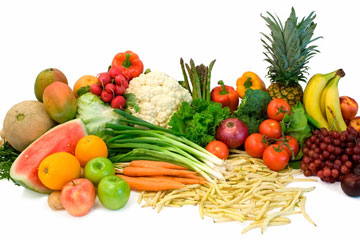 Researchers have found that a vegetarian diet is more effective to shed pounds than a diabetic diet. Fruits and vegetables play a significant role in a healthy, balanced diet and keep us filled while we are trying to lose weight. The latest findings of a new study published in Medical News Today say that a proper plant-based vegetarian diet effectively reduces the muscle fat and improves metabolism, and is a good option for those with type 2 diabetes to lose weight or normal people who need a weight loss diet.
Researchers have found that a vegetarian diet is more effective to shed pounds than a diabetic diet. Fruits and vegetables play a significant role in a healthy, balanced diet and keep us filled while we are trying to lose weight. The latest findings of a new study published in Medical News Today say that a proper plant-based vegetarian diet effectively reduces the muscle fat and improves metabolism, and is a good option for those with type 2 diabetes to lose weight or normal people who need a weight loss diet.
The best and easiest way to lose your weight is by following a healthy diet. Choose from a wide range of vegetables, fruits, whole grains and beans, which not only help in weight loss, but also bring about major improvements in cholesterol, blood pressure, blood sugar and many other health aspects. This low-fat, vegetarian diet is safe and easy to follow, and is high in fiber and low in fat. It may be a bit difficult while starting the diet because it consists of lots of vegetables and fruits. But you will get used to it over time.
Follow this diet completely for the first three weeks and check for other positive health changes. A vegetarian diet can help to attain significant weight loss, improve the control of blood glucose, raise insulin sensitivity and improve metabolism. The overall principle of a plant-based vegetarian diet is to avoid all animal products and saturated fat and choose plant foods. Keep vegetable oils to a minimum level.
While dieting, it is important to have the nutrients in adequate amount in your diet, so including four food groups daily in your intake can incorporate all the nutritional bases and at the same time it can aid you in your weight loss goal. The four food groups are:
- Vegetables: It is good to take raw vegetables at least one serving a day. Raw vegetables can be consumed as salads, carrot sticks, Brussels sprouts or cabbages. Dark green vegetables like kale or broccoli, which are high in calcium, should also be included. Aim to have 4 servings of vegetables (cooked) each day.
- Fruits: Try to have 3 servings of fruits each day that are low-calorie and high-nutrition fruits like strawberries, kiwis, mangoes, blueberries, peaches, plum, oranges, grapefruit and raspberries. Try not to have fruit juices more, instead eat the fruit as whole.
- Grains: Foods that are whole grain sources such as wheat bread, brown rice, whole wheat pasta, bran cereal and oatmeal are advised 8 servings a day (that can have half a cup of cooked grains or 1 cup of dry cereal).
- Legumes: Legumes include beans, chick peas, lentils and low-fat soymilk, which should be taken at least 1 cup every day. This can be considered as meat substitutes.
Sweets are optional as these have a lot of fat and sugar, which is not good for weight loss. So, if you are craving for sweets, then 1 serving per day, that too, fat-free sweet is allowed. Low-fat sweet ideas include a bowl of sweetened whole grain cereal with low-fat soymilk, a soymilk/fruit smoothie, or sautéed bananas or apples (in water and a bit of maple syrup) with a little cinnamon.
Those who follow a vegetarian diet show greater reduction in intramuscular fat (fat stored in muscles) and it helps to increase the mobility and muscle strength which could be of more benefit to aged people.